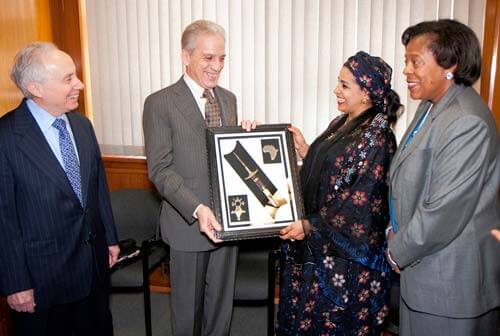The First Lady of the West African nation of Niger, Dr. Malika Issoufou Mahamadou, last week visited SUNY Downstate Medical Center and University Hospital, as part of her United States itinerary.
The First Lady, who holds degrees in medicine and tropical medicine, made a courtesy visit on President Dr. John C. LaRosa and CEO Debra Carey.
She also toured the hospital’s Transplant Unit, the Neonatal Intensive Care Unit, the Child Life Center, and a nursing station, as well as the medical center’s School of Public Health.
“We were very pleased to welcome the First Lady,” said Dr. LaRosa told Caribbean Life.
“Her visit amplified Downstate’s engagement with global health issues and highlighted the international programs hosted by our School of Public Health,” he added.
Delegation members included Barry Bibata Niandou, Minister for the Promotion of Women and Protection of Children, and Maman S. Sidikou, Niger’s Ambassador to the United Nations.
Niandou, a distinguished jurist, is a major figure in the fight for women’s rights in Niger.
Amb. Sidikou, who presented his credentials to President Barack Obama in January, previously served as an official in the Niger government and has worked for a number of international development organizations, including the United Nation’s Fund (UNICEF) and the US Agency for International Development (USAID).
Dr. Mahamadou’s visit was part of her efforts to upgrade health care in Niger.
Located in sub-Sahara, Niger faces numerous public health challenges, including malaria, diarrheal diseases, malnutrition, and infectious diseases, complicated by high levels of poverty and limited access to potable water and essential health services.
Because Niger suffers from high levels of infant and maternal mortality, Dr. Mahamadou has a particular interest in improving healthcare services for women and children.
She is also interested in transplantation and dialysis. There are several individuals on dialysis in Niamey, Niger’s capital.
Dr. Mahamadou told Dr. Devon John, Downstate’s chief of transplantation, that she would welcome a visit by him to Niger to discuss the feasibility of doing transplants there.
“We hope that this will be part of a strong and productive relationship,” Dr. LaRosa told the First Lady, explaining that Downstate, which has international programs in Eastern Europe, Haiti, and South Africa, has a strong commitment to global health.
Dr. Pascal J. Imperato, dean of the School of Public Health (SPH), spent several years working in Africa, including in Niger, and is familiar with the country and its health issues.
Under Dr. Imperato’s leadership, Downstate’s School of Public Health sponsors a highly successful Global Health Program for fourth-year medical students in India, Thailand, the Dominican Republic, sub-Sahara Africa, and Latin America.
In recent years, alumni from the School of Public Health have worked in Nigeria, Ghana, and Liberia.
Dr. Mahamadou expressed interest in expanding Downstate’s international programs to Niger.
Besides Drs. LaRosa, Imperato and John, and Ms. Carey, the First Lady also met with Margaret Jackson, chief executive nurse, and Michael Harrell, assistant vice president for community and governmental relations.























